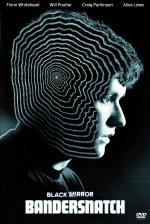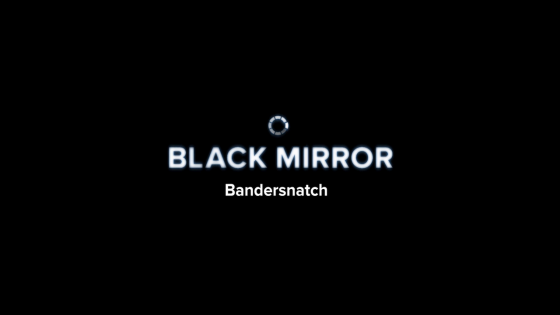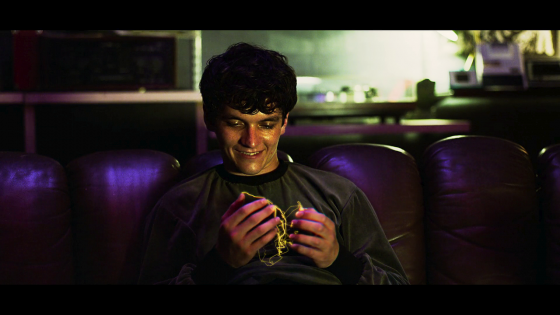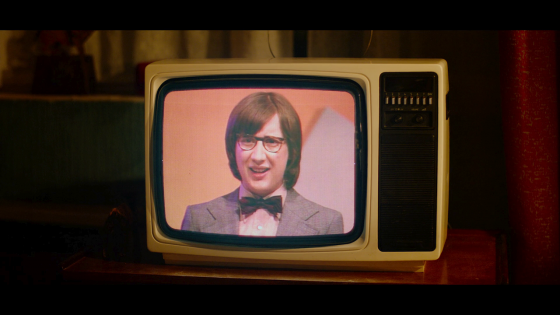
Everygamegoing
 3rd July 2023
3rd July 2023
Black Mirror: Bandersnatch
I'm a big fan of Black Mirror. Its director, Charlie Brooker, clearly has a lot of time for both retro games and the "scene" that surrounds them, and, while many of the episodes of Black Mirror are based in the future, these often include the odd nod to the past. Bandersnatch is an extremely imaginative episode for those of us who remember the rise and fall of Imagine Software, and the adverts of the early Eighties that teased a Spectrum game of the very same name. A game that was destined never to appear...
So, firstly, a bit of history to all those who were born after the heyday of the Spectrum. The early Eighties were a time of many different competing music styles - everything from Abba to The Sex Pistols came from this period - and there was only one place to be every Sunday night, and that was listening to the top 40 singles chart. New artists would frequently release a song that catapulted them to what seemed like instant fame, and go from signing on at the local job centre to singing off on Top Of The Pops and banking thousands. And into this scene stampeded a new phenomenon - 80's computers. With the power to 'compose' a program in your bedroom, there was a short period of time when we all assumed that computer games also needed their own charts, and where a kid talented enough to write a quirky platformer could become an instant millionaire.
In those early days, games were written by one person. Copyright was pretty lax, meaning mainstream ideas were sort of up for grabs in a way that they wouldn't be today. You could write a game featuring James Bond, for example, without getting permission from United Artists. Or you could rip off something like Namco's Pac-Man and slap a different name on it (like Cosmic Cruncher) and get away with it. And, for a short period, certain companies began to treat their programmers like megastars. Imagine Software was one of the companies that featured prominently in 1983, with reports that it was employing some teenage geniuses on million pound contracts and, whether this was true or not, it was certainly 'news' to all those children who were just discovering the very first computer games. It had them considering whether to write computer games as a career, and many hundreds of companies had such job vacancies, which were listed right next to the reviews of new games in the popular computing magazines of the day.
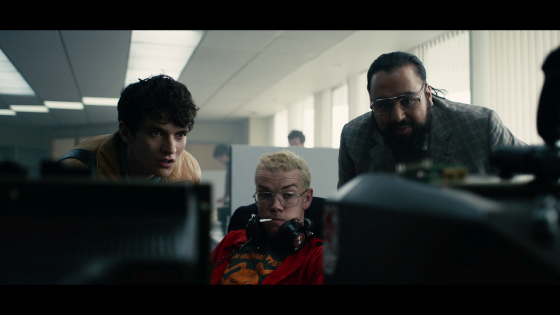
Yes, this was an exciting time to be alive. And Imagine Software were one of the first companies to recognise that marketing a game was more about producing a game with fantastic cover art than the actual code. Within a few months of starting up, it was dividing the roles into the departments that, nowadays, we all take for granted: actual coding, graphic design, cover illustration, testing, etc. Bandersnatch was, it claimed, its first 'mega-game'. It was to be released for the Sinclair Spectrum and would come on a ROM cartridge, with up to 256K of ROM to hold its code, which would mean that 48K Spectrum wouldn't know what had hit it. This game would be desired by everyone who owned a Spectrum, and with over two million Speccies in homes by this point, Bandersnatch would become synonymous with the machine itself, much as the BBC Micro became known for Elite.
However, it all went wrong. As one of the first games designed 'by committee', no-one at Imagine seemed to have much idea of exactly what Bandersnatch was actually going to be. Even more intriguingly, the collapse of Imagine, of which Bandersnatch was a large part, was chronicled in full by a documentary crew who thought they were making a programme about high salaries and computer whizzkids, only to witness angry distributors chasing demands for payment, and an ever more frantic board of directors realising just how much difficulty the company was actually in.
Well, Black Mirror: Bandersnatch isn't that story, but it does draw a few of its main plot points from what happened at Imagine, with the fictional Tuckersoft offering a job to young Spectrum coder Stefan Butler and its boss echoing the former company's vision to have a dream team of professionals putting together products that are a cut above the games that are currently on the shelves of WHSmiths. Butler is, however, a troubled soul. He lives alone with his father, and is heavily medicated whilst also taking regular visits to see a psychiatrist. The cause of Butler's trauma is that he feels responsible for the death of his mother. You see, when Butler was a child, his mother came to his bedroom to collect him to go into town one morning. Butler had a favourite toy, a stuffed rabbit, and he couldn't find it. His mother helped him look for the toy, but he didn't want to leave without it, and so his mother ended up taking a later train to the town alone - which then derailed, killing her and many others onboard.
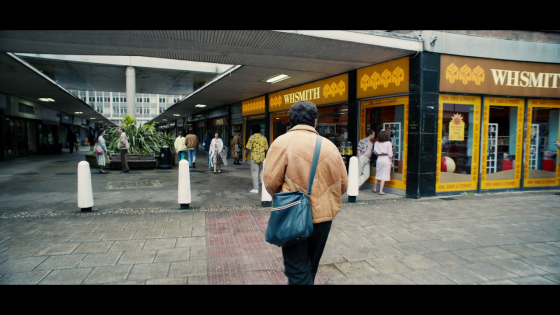
In the early Eighties, and against this self-same background of one-person-programmed games, Butler is reading Jerome F. Davies's Bandersnatch, a science fiction Choose Your Own Adventure book, in which he can make choices for the protagonist, flipping to non-sequential pages in the book to play out many different stories. Naturally enough for someone who desperately wishes he could change his decision to look for the toy that fateful morning ten years ago, Butler is crafting a game based on the Bandersnatch book. He gives the boss at Tuckersoft a quick demonstration of what he has written so far, showing how the game branches depending on the decisions which the player takes, but with the game being both very complicated, and very unfinished, it doesn't take long until it crashes. Butler murmurs that he "hasn't programmed that path yet", and later covers the walls of his bedroom with hundreds (and quite possibly thousands) of intersecting pathways, involving time travel, government conspiracies, the 'thief of Fate' and myriad other eventualities.
Black Mirror: Bandersnatch is a very unique film, because you, the viewer, are also invited to make decisions for Butler. An early scene invites you to choose what breakfast cereal he will eat - a seemingly inconsequential decision. However, later you can also choose which tape he chooses to put into his walkman, and your choice provides almost the entire soundtrack for the film from that point on. Later decisions are much more dramatic in nature, and you can be called upon to bash your poor old dad over the head with an ashtray, leap from a balcony, or even to communicate with him through his ZX Spectrum. As Black Mirror: Bandersnatch was originally available on Netflix, some branches of the film become very 'meta' indeed: if you tell Butler you are watching him via a streaming platform from the 21st century, he naturally enough doesn't have a clue what you're talking about, and when he repeats it, people around him start to question his sanity.
Part of the appeal of Black Mirror: Bandersnatch is in discovering all the different 'unlockable' scenes that exist if certain actions are performed, or even if certain actions are performed but in a different sequence. Some paths lead to very strange outcomes indeed, but many lead to the eventual release of Bandersnatch the game, and a sort of 8-bit Tomorrow's World style of TV programme where the game is reviewed, gaining either favourable or unfavourable ratings. For example, when Butler is originally offered the job, the boss asks him if he would prefer to work alone or with the team. Opting for the team route brings an almost painfully quick ending which the programme hammering the final product as a complete mess. But going it alone is fraught with problems too, as Butler's obsessional behaviour quickly brings the ire of his long-suffering father upon him. There's also the not insignificant revelation that the book's author (Jerome F. Davies) went completely mad, not to mention that Tuckersoft's star programmer, Colin Ritman is convinced that Pac-Man, is actually PAC-Man, which PAC stands for Program And Control, and that the whole game is a metaphor for the illusion of free will whilst being boxed into a maze, pursued by demons likely only to exist in his mind. Not exactly the best companion if the state of your mental health is fragile to begin with.
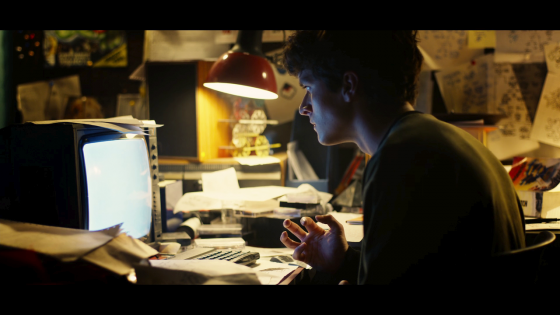
Without giving away too much (Too late, I know!), Black Mirror: Bandersnatch plays out in a quite genial way. Many endings will offer you the chance to start again, but you don't have to watch the whole film again to catch up to the decision which will alter its path - instead there's a very quick recap of key scenes and you're straight back into it. The ending which will see 'your' game awarded 5 out of 5 stars is not the most obvious by any means.
In conclusion then, if you have any interest in retro gaming, I would consider Black Mirror: Bandersnatch a must watch. Firstly, it's incredibly evocative of the time period it depicts - nowadays it seems almost unbelievable that a fresh-faced kid could walk into a company with a half-baked idea for a game, get signed up the same day and be expected to write the thing alone, and that the boss would just assume it would be ready for release on a certain date because that date it had to go to the duplicators. But in the early Eighties, this actually did happen. Secondly, it's all set against a background of Eighties music and culture that feels all-enveloping. I love the fact that there's an old-fashioned WHSmiths store, with even the old style carrier bags being given out, and that Butler eats Sugar Puffs and listens to the Thompson Twins on his walkman each morning. The game Colin is working on - Nohzdyve for the Spectrum - is even included as a playable Easter Egg too, making this the first film that includes a free Spectrum game.
And finally, the Eighties were synonymous not only with electro-pop, synthesisers, Spectrums and a fledgling gaming industry; they were also awash with Choose Your Own Adventure books. Well, at least they were if you were a child in this era, as I was. Meaning that, cumulatively, this film just gets so much right that it positively embroiled me in its world. Typical run time is about 90 minutes, but it's so engaging that I have come back and re-watched the whole thing on several occasions now.
What more can I say? If you haven't seen it yet, what are you waiting for?

